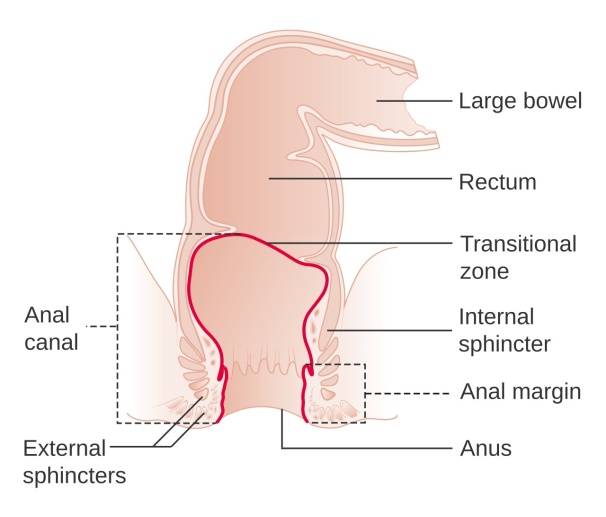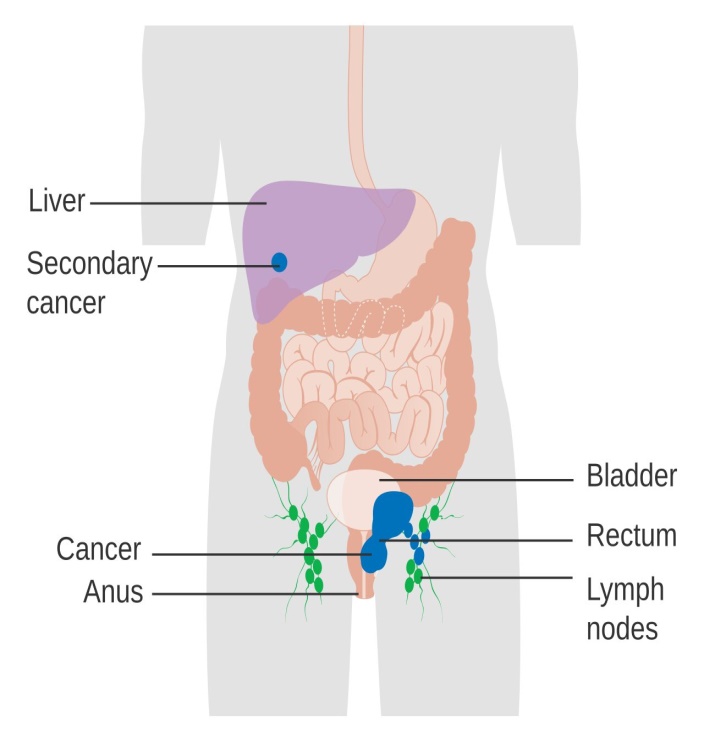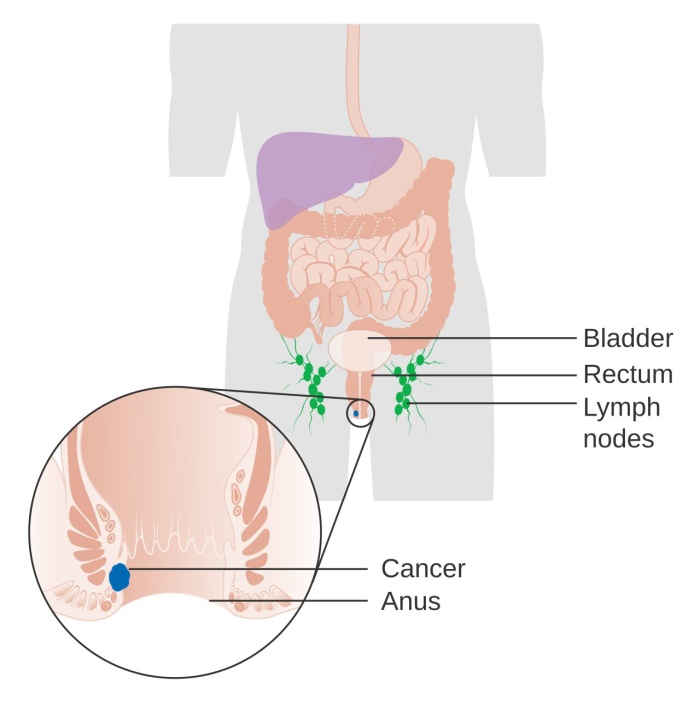What is anal cancer?
When cancer cells form into benign or malignant tumors in the tissues of the anus, anal cancer has occurred.
The anus is the opening at the bottom of your intestines where stool exits the body. Anal cancer is rare, but when it occurs, it may spread to other parts of the body. Some noncancerous forms of anal cancer can also turn cancerous over time. If you have any of the below symptoms and risk factors, talk to your doctor about your concerns
Types of anal cancer
- There are different types of butt-centric malignant growth, each characterized by the kind of tumor that creates. A tumor is an anomalous development in the body. Tumors can either be considerate or threatening. Dangerous tumors may spread to different pieces of the body over the long run, whenever left untreated. Instances of tumors include
- Benign tumors. Tumors that are benign are noncancerous tumors. In the anus, this can include polyps, skin tags, granular cell tumors, and genital warts (condylomas).
- Precancerous conditions. This refers to benign tumors that may become malignant over time, which is common in anal intraepithelial neoplasia (AIN) and anal squamous intraepithelial neoplasia (ASIL).
- Squamous cell carcinoma. Squamous cell cancer is the most common type of anal cancer in the United States. According to the American Cancer Society, it accounts for 9 out of 10 cases. These malignant tumors in the anus are caused by abnormal squamous cells (cells that line most of the anal canal).
- Bowen’s disease. This condition, also known as squamous cell carcinoma in situ, is characterized by abnormal cells on anal surface tissue that haven’t invaded deeper layers
- Basal cell carcinoma. Basal cell carcinoma is a type of skin cancer that generally affects skin exposed to the sun. Because of this, it’s a very rare form of anal cancer
- Adenocarcinoma. This is a rare form of cancer that arises from the glands surrounding the anus

What causes anal cancer?
Anal cancer malignant growth is brought about by the improvement of strange cells in the body. These irregular cells can develop wildly and gather, framing masses known as tumors. Progressed disease cells can metastasize, or spread to different pieces of the body and meddle with ordinary capacities. Anal cancer disease is believed to be caused to a limited extent by the human papillomavirus (HPV), an explicitly sent contamination. It's pervasive in a greater part of Anal cancer malignant growth cases. Anal cancer malignant growth may likewise be brought about by different tumors in the body spreading to the Anal cancer waterway. This is when disease grows elsewhere in the body first and afterward metastasizes to the rear-end.
There are two main types of esophageal cancer and they are Adenocarcinoma, Squamous cell Carcinoma. Some rare types of esophageal cancer are small cell Carcinoma, Sarcoma, Lymphoma, Choriocarcinoma, and Melanoma.
What are the symptoms of anal cancer?
Anal cancer symptoms can be similar to those of hemorrhoids, irritable bowel syndrome (IBS), and many gastrointestinal diseases. These include:
- changes in bowel habits
- thin stools
- bleeding from the rectum
- pain, pressure, or the formation of a lump near the anus
- discharge from the anus or itching
If you’re not sure what’s causing any of these symptoms, you should go to your doctor for an evaluation. They’ll be able to do tests to diagnose which condition these symptoms belong to.

What are risk factors for anal cancer?
Only about 0.2 percent of all U.S. people have a risk of being diagnosed with anal cancer at some point during their lifetime. Anal cancer can occur in any person, but some people have a higher risk of developing it than others. Risk factors include:
- HPV infection HPV is a group of viruses that are sexually transmitted and remain in the body after infection. HPV is present in most cases of anal cancer. It was also the leading cause of cervical cancer before the introduction of routine Pap smears.
- HIV HIV puts people at a higher risk of anal cancer because of how it compromises your immune system.
- Sexual activity Having multiple sex partners and having receptive anal sex can increase your risk of getting anal cancer. Not wearing barrier protection, like condoms, also increases the risk of anal cancer due to an increased risk of contracting HPV.
- Smoking Smokers are more likely to develop cancer of the anus, even if they quit smoking.
- A weak immune system A weakened immune system can leave your body defenseless against anal cancer. It’s most common in people with HIV and people who take immunosuppressants, or who have had an organ transplant
- Old age Most cases of anal cancer occur in people over the age of 50, according to the Mayo Clinic.
How is anal cancer diagnosed?
Anal cancer often presents with rectal bleeding. People who experience bleeding, itching, or pain in the anus often go to the doctor before anal cancer progresses past stage one. In other cases, anal cancer is diagnosed during routine exams or procedures. Digital rectal exams can detect some cases of anal carcinoma. These are usually part of a prostate exam for men. Manual rectal exams, where the doctor inserts a finger into the anus to feel for lumps or growths, are common in pelvic exams for both genders. Anal Pap smears can also be used to test for anal cancer. This procedure is similar to a traditional Pap smear: A doctor will use a large cotton swab to collect cells from the anal lining. These cells are then studied for abnormalities. A doctor may also biopsy a set of cells or tissues to test for anal cancer if an abnormality is detected.
How is anal cancer treated?
There’s no cure for anal cancer, but many people who are diagnosed with it go on to live healthy and fulfilling lives. Depending on your age and the stage of the cancer, there are several treatment options that doctors may offer you, either by themselves or in combination
- Chemotherapy : - Chemotherapy can be used to kill cancer cells and prevent them from growing. It can be injected into the body or taken orally. Pain relievers may also be used intermittently to control symptoms.
- Surgery:- Local resection surgery is often used to remove a tumor in the anus along with some healthy tissue around it. This procedure is most common with people whose cancer is in the lower part of the anus and hasn’t spread to too many nearby structures. It’s best performed in cancers that are early stage and for tumors that are small. Abdominoperineal (AP) resection is a more invasive surgery. This surgery is reserved for people who haven’t responded well to other treatments or who are late stage. It involves making an incision in the abdomen to remove the anus, rectum, or parts of the sigmoid colon. Because this surgery removes the entire lower portion of the GI tract, the surgeons create an ostomy, which is a connection from the GI tract to the skin. A patient who receives an ostomy will need to collect their stool in an ostomy bag.
- Alternative therapy:- Radiation therapies are common for many forms of cancer, including cancer of the anus. X-rays and other radiations are used to kill cancer cells in the body, though they may also kill surrounding healthy tissue. This treatment is noninvasive and is usually combined with other cancer treatments
What is the outlook for anal cancer?
Many people are able to live long, healthy lives after diagnosis. Early detection is the key to sustained health. According to the National Institutes of Health (NIH), the overall five-year survival rate for people with anal cancer is 66.9 percent, based on data gathered from 2007-2013. Additionally, people with localized anal cancer have an 81.3 percent survival rate.
There’s no guaranteed way to prevent anal cancer, but there are some ways to reduce your risk of getting it:

Surgery
Surgery that can be used to treat esophageal cancer includes:
- Practice safe sex: - You can practice safe sex by limiting the number of sexual partners you have, using condoms during sex, avoiding receptive anal sex, and getting tested regularly for sexually transmitted infections.
- Stop smoking:-Stop smoking and avoid secondhand smoke whenever possible. If you need help, here are some tips to quit smoking.
- Get vaccinated: - A three-dose series HPV vaccination is approved for both females and males between the ages of 9 and 26. This vaccination will protect people from some HPV types that commonly cause anal cancer. If you have a high risk of anal cancer due to other factors, such as family history or age, make sure to discuss your concerns with your doctor. .
OneSmarterHealth is a pre-eminent cancer portal which helps you to connect with the best cancer consultants from the top 10 cancer hospitals in the USA. By clicking directly, you will get a second opinion and online consultation from the reputed oncologists in the USA.
So, what are you waiting for? Visit the website of OneSmarterHealth and connect with them for a second opinion from an US-based doctor. Your one simple step can bring a smile to your loved ones.
